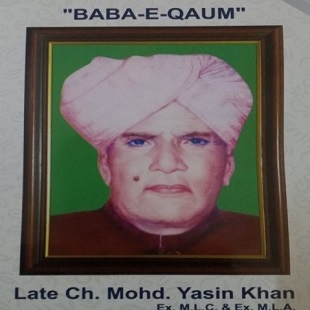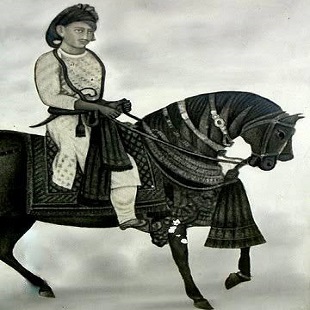People and Personalities of Nuh District
People and Personalities of Nuh District
The big stories often make the headlines of our historical narratives, but history is not only about the landmark events - it finds shape and character in the myriad events that led up to a flashpoint of change. An attempt to discover and document stories of people, events, and places linked to the freedom struggle of India at the micro level of the district has led to the creation of a Digital District Repository. Stories in this section can be broadly classified under - People & Personalities.
Chaudhary Mohammad Yasin Khan
 Chaudhary Mohammad Yasin Khan (1886-1970) was born in village Rehna of District Gurgaon (now Nuh). He was a great educationist, politician, social activist, and above all the torchbearer of the Mewati community. He established a school at his village Rehna which was later shifted to Nuh. He wanted to upgrade it to High School. The Deputy Commissioner of Gurgaon district Mr. F. L. Brayne, himself being an educationist assured him every kind of help to improve the condition of the backward community of Mewat. By their joint efforts, a High School was established on 20 March 1923 by merging the Middle School Nuh and Middle School of Zilla Parishad at Nuh. Sir Fazal-e-Husain, the Education Minister of Punjab, Iaid the foundation stone of that High School.
Chaudhary Mohammad Yasin Khan (1886-1970) was born in village Rehna of District Gurgaon (now Nuh). He was a great educationist, politician, social activist, and above all the torchbearer of the Mewati community. He established a school at his village Rehna which was later shifted to Nuh. He wanted to upgrade it to High School. The Deputy Commissioner of Gurgaon district Mr. F. L. Brayne, himself being an educationist assured him every kind of help to improve the condition of the backward community of Mewat. By their joint efforts, a High School was established on 20 March 1923 by merging the Middle School Nuh and Middle School of Zilla Parishad at Nuh. Sir Fazal-e-Husain, the Education Minister of Punjab, Iaid the foundation stone of that High School.
Chaudhary Mohammad Yasin Khan-led movements against the princely state of Alwar and Bharatpur so that the fate of Meo peasants improves. He was elected as a member of the Punjab Assembly on the ticket of the Unionist Party when the first general elections were held in 1926. From that very time, he was continuously elected as Punjab Assemblymember from 1926-to 1946. After the partition of India, Chaudhary Mohammad Yasin Khan came in contact with the Congress party as he sought their help in controlling the mass emigration of the Meos to Pakistan. He joined the Indian National Congress in 1947 and continued to hold his position as a member of the Punjab Assembly from 1952-1962.
Nawab Shamsuddin Khan
 Assassination of William Frazer, Commissioner of Delhi Territory & Resident
Assassination of William Frazer, Commissioner of Delhi Territory & Resident
Nawab Shamsuddin Khan (1827-1835) was the ruler of Firozpur Jhirka Jagir which was granted by the British Government to his father Ahmad Baksh Khan in 1803. After his father’s death, Shamsuddin Khan became nawab of the Firozpur Jhirka principality. Nawab Shamsuddin Khan had enmity with the Commissioner of Delhi William Fraser over his illegal and undue intervention in the political affairs of Firozpur Jhirka. As the animosity arose, Nawab Shamsuddin Khan employed his sharpshooter servant Karim Khan Meo of Rangala village to kill William Frazer. Karim Khan was popularly known as “Bhar Maru” (sharp-shooter), due to his sharpshooting, courageous and murderous characteristics. Karim Khan easily agreed to end the game of William Fraser, and accordingly went Delhi along with his servant Annia Meo, a famous runner. Karim Khan Meo, after a long wait of many months, finally got the opportunity on 22 March 1835, and at 11 pm on the same night, he shot dead Mr. Fraser near his residence.
After a detailed inquiry, the British Officers reached the conclusion that Nawab Shamsuddin Khan was behind the murder of Mr. Fraser. They arrested Annia, the servant of Karim Khan Meo, made him the government witness on the condition of sparing his life. On the witness of Annia, both the Nawab and Karim Khan were arrested and executed on Thursday morning, 3 October 1835, close outside the north of Kashmiri Gate, leading to the cantonments. By the execution of both the Mewatis and confiscation of the Firozpur Jhirka State, there spread the resentment and non-cooperation to the government in Mewat. Many leaders even revolted against the British Government. Maulana Abdullah Khan Mewati of Firozpur rose in an open revolt in which hundreds of Mewatis were arrested and killed, including Maulana Abdullah Khan Mewati. Although the British Government brutally crushed the Mewatis before their rising, they could not be controlled at the time of the First War of Independence of 1857. Many scholars believe that the execution of Nawab Shamsuddin Khan was one of the reasons for the Mewati Rebellion of 1857.
Source :
- Provided by Sh Harshit Kumar, IAS, 2020 (Haryana)
- Azadi Ka Amrit Mahotsav
Last Modified : 8/19/2024
This topic provides information about People and P...
This topic provides information about People and P...
This topic Provides information about Personalitie...
Provides information related to People and Person...
